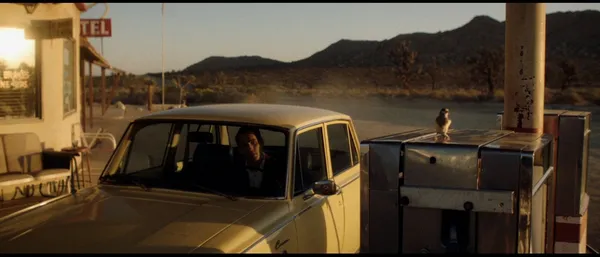 |
| The Last Stop In Yuma County |
When it first emerged in 2023, indie thriller The Last Stop In Yuma County didn’t have a big platform, despite screening at the likes of Fantastic Fest, but it did wow audiences wherever it went, gradually building up a cult following – and with good reason. The début directorial feature from Francis Galluppi, it’s funny, stylish, clever, packed with unforgettable characters and gripping throughout. Now it’s finally becoming available to viewers in the UK, thanks to a Blu-ray release from Arrow.
Meeting stars Jim Cummings (who plays a hapless knife salesman) and Richard Brake (who plays a bank robber on the run), I told them that one of the reasons I think I haven’t been able to get it out of my head is that in all the months since I first saw it I haven’t been able to figure out a decision that either of their characters could make to change his fate. Jim admits that he’s in much the same position.
“In talking to Francis, much of his writing is about this universe where everything, of course, is going to go badly,” he says. “There’s crime doesn't pay, but then also the fact that we're all at this bizarre location, it feels like all of these characters have been set up to do this morality tale where everything goes wrong. All of us were working together towards this conundrum of how can Murphy's Law come to its full fruition, with everything that can go wrong.”
 |
| Jim Cummings in The Last Stop In Yuma County |
Was that part of what attracted him to it in the first place?
“Honestly, what attracted me to it was working with everybody,” he says. “Working with Richard, and just being able to do the kind of cowardly performance of like a Paul Newman movie where it's not a handsome, cool guy. It's an idiot. And how does an idiot survive this thing?
“I remember Francis came over to my house and he pitched the movie to me. I'd read the script and thought it was great. And that was when it was a much smaller movie. I was talking to my team and I was like, ‘I'll do it. I think it could be a very cool kind of Coen Brothers, bag of money, running in the desert kind of thing. I've never done that before.’ And we were up to do another project, so the timing wasn't going to work out. But then, of course, with Hollywood, that fell through, and then I was able to do it.
“I knew from the beginning, he can't be Bruce Willis. It has to be a goofy person because the audience will associate with that. If there is a hostage situation, it never goes like it does in the movies. It's always much more uncomfortable. There's Stockholm syndrome. There's all kinds of complicated things that you can't show in an action film. And so by having it be me, Francis knew that not only would it carry the people who like the dumb bullshit that I do, but also that it would make the character funnier.”
I ask Richard if it was the same for him.
“The fact Jim was going to be in it was he huge thing,” he says. “I mean, I came on very early, even before Jim. Francis sent me the script a good couple years before. It was actually right before Covid, I remember, so a good couple years before we shot. And I just loved this script and loved Francis. I was just chatting with him and he wrote me a lovely letter as well. So I signed on right away. But at the time I don't think he’d cast anyone. So then eventually I got a message: ‘Oh, Jim Cummings might be doing it.’ And I was over the moon.
“I love Jim's work. Thunder Road is one of my favourite all time films. And then he would just send me a list all the time. That he had Gene [Jones], and Jocelin [Donahue], who I'd worked with before. It was just one incredible actor after another. So I was over the moon that I had said yes already, and they got this incredible cast and eventually we got to all make an independent film, which is tough to get made. Eventually he got it financed thanks to a wonderful producer who put his house up for it.
“We made it and there's been an incredible reaction to the film both in the US and now here. I'm incredibly excited. I live in London and have many friends going, ‘When am I going to get to see it?’ To finally have a date, to be able to tell them they can watch it...” He smiles contentedly.
We talk about the process of character creation, much of which took place over Zoom during Covid lockdowns.
“For me, the character is sat in a booth the whole time,” says Jim. “And so Francis and I talked about the character – who actually had a name, but it wasn't The Knife Salesman. The whole time I was thinking about it, I was like, ‘This guy is very earnest.’ So that was the name and the word that I kept going back to, where this guy is just really trying to do the right thing. The road to Hell is paved with good intentions.
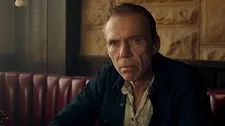 |
| Richard Brake in The Last Stop In Yuma County |
“Francis and I talked about that a lot. But then Francis and I are big fans of South Park, and so every chance that we could, I was always pitching something funny or just a micro performance that would just tell that we're on the side of the audience, that we understand where the audience is on the roller coaster, which I always find to be very funny. And Francis is very receptive. Francis, for my character, was like, ‘Yeah, let's see what we can do.’ So we’d get it in six or seven takes, and then one of them ends up in the movie, and he’d usually pick the one that was goofy. He’d usually pick the one that was humiliating of me, and that's always fun.”
There’s a key scene in which he’s trying to demonstrate his knife salesmanship, which tells us a lot about the character.
“Yeah. But I need a tomato to be able to even show up. I'm not a very good salesman. My favourite bit in that is that I'm trying to sell knives to Jocelin [as waitress Charlotte] and she's not interested. And then she's trying to sell me rhubarb pie, and I'm like, ‘No, I'm not interested.’ And then she's like, ‘Actually, maybe you'd like it for your daughter.’ And I'm like, ‘Oh, yeah, that's a good idea.’ It's lost on me that she's a better salesman than I am. I don't understand the shtick of selling stuff. It's very funny.”
Richard explains that his character changed far more dramatically during the development stages.
“With Francis, when I initially spoke to him, pre-Covid, long before we made it, one of the things we talked about was that Beau was not going to be a seasoned criminal. We had this whole idea of him being much gentler, somebody who was out of his depths in terms of what he was doing. Maybe he wanted to raise money because he was trying to get his daughter back, or some story. And then I kept looking at the script and reading it. And about two weeks before we started shooting – I mean, this was many years later, we were just about to shoot – Nick [Logan] had already been cast as my brother, and he was coming up with all these crazy ideas. And I kept looking at the script and it suddenly dawned on me that the character had to be terrifying for the film to work, because he needed to be the polar opposite to what we had originally thought.
“I thought, God, I’ve got to tell Francis, it's two weeks before he starts shooting. This is going to throw him. I was anxious about it. I was shooting in a Slovakian movie. That night I was about to have a Zoom call with Francis. I was pretty nervous about Francis’ reaction. It's quite a heavy thing to throw at a guy two weeks before he's shooting his first feature. And I got on the phone and he said to me, ‘Look, I need to tell you something.’ I said, ‘Well, I’ve got to tell you something. And he goes, ‘Okay, you go first.’ And I don’t remember, but one of us went first and I said my spiel. And he goes, ‘That's exactly what I was going to tell you. During the read through, it dawned on me.’
“He said that he needed to be not what we had thought, but actually terrifying, you know, which I'm not bad at doing. So we both had literally had this same idea. And he was nervous about what my reaction would be. He thought one of the reasons I wanted to do it was to play somebody not terrifying, and ironically, both of us completely wanted the same thing. And so it was. That was a huge shift of character two weeks before shooting, but it worked.”
“To act against Richard is very frightening when he does that,” says Jim. “When he shouts ‘Got it?’ at us, we didn't know the volume at which that line was going to be delivered, and Jocelin’s and my reaction is very genuine. That whole scene feels like Funny Games. It's like being held hostage, and it's like this kind of pseudo couple next to each other. And it was very frightening. But it's very good.
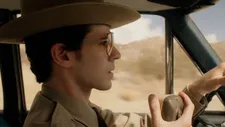 |
| Connor Paolo in The Last Stop In Yuma County |
“I think really Francis was trying to do that thing where it's like, criminals don't break the law because they're malicious. There's backstory, and I still see it in Beau the first time he realises things are going to go badly and he has to go inside and Nick is not going to play along. Nick goes in by himself and he's alone in the car. It’s the only time that we see him alone in the car, and he goes ‘Fuck.’ And it's just such a small moment, but it says so much to the audience of, like, this is not going to go well.
“He’s the person who knows everything about how the thing should be run. He's very succinct as to how to get away with bank robbery, he realises it's going to be far more complicated. I see that as a very endearing, thoughtful moment. I remember the creators of The Sopranos said ‘You don't have to show good people. They don't have to be likable. So long as they're good at their jobs, the audience will appreciate it.’ And it's very true.”
“I wanted him to be very, very quiet and very in control,” says Richard. “Once we'd made that decision to shift some of the story behind Beau and his role in the film, and also because Nick had created this wonderful, very, very opposite character to Beau, I wanted him to be incredibly still, because I think it's terrifying to be very, very still. But as an actor, it's actually effing terrifying to try and be very, very still, because you can feel like you're doing nothing and the audience will be bored out of their skull and not see the work, the thoughts, the character of Beau, they'll just see someone being dull as dishwater. So in order to do that, I had to really trust Francis.
“It was really down to Francis, as much as anything, because 90% of the time I thought I was not doing enough, that it was just going to bore people. You know, this scene that Jim just mentioned, I thought ‘This is going to be boring.’ Even when I saw a very rough cut of it, without any sound or anything, that Francis had on his little computer screen. I didn't have my glasses, so I was watching it in about this place.” He presses his head up towards his hand, squinting. “I thought, ‘This is the end of my career. That's the dullest actor I've ever seen on the planet.’ And yet when I finally did see it, when it was all done, it worked. And it worked really, as much as anything, because of Francis, because I trusted him.”
“We would shoot a scene, and I'd be behind the camera so I could see the monitor,” says Jim, looking at Richard. “And it's very good. It's a small intimidation. It's the bit with the quarter, just this small mannerism, and I remember you being like, ‘Oh, it's terrible. I'm not going to do it. It's not going to work. Let's do it again. Let's do it again.’ And the whole time I was like, ‘It was excellent. I can see it. What are you talking about? It's going to be great.’
“I guess everybody feels that way. I'm just like, ‘Oh, I want to make sure that it comes across right.’ But it is funny. You do have to trust Francis that he's going to put in all of the work and all of the sound design and all the framing, and every one of those scenes works. It's a testament to his craftsmanship, being able to put in all the work to make it cinematic, and the fact that he was thinking about all of these spinning plates at once. It's a very complicated movie. Despite the fact that it's one location, there's a lot going on spatially and performance wise, on the roller coaster. It's wild.”
I mention that Francis told me it was particularly difficult to carry people with him when proposing the musical sequence in the middle of the film, and that nobody was very confident about that.
“I thought ‘Is this going to work?’” Richard admits. “I mean, he had these shots that he worked out and with that particular sequence, I think by the time we shot that, I began to think ‘This guy knows what he's doing, I'm just going to trust him.’ Because it felt really stylised and over the top. And I was acting and I was doubtful and yet, at the same time, I wasn't anxious about it. I just thought, ‘This is going to work.’ And lo and behold, it's an incredible set piece.
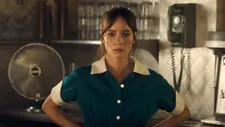 |
| Jocelin Donahue in The Last Stop In Yuma County |
“Jim and Francis, I mean, I'm pretty well versed on film, but these two were just believable. I mean, I thought I knew obscure films. These guys know everything about every film. They're very similar. It was wonderful to watch the two of them working together. Even my favourite films, I can't remember the shots and things like that, like they can. I loved it.”
“Every morning we'd be talking about the criteria,” says Jim. “But I will say I was the biggest hater on the Crying, Roy Orbison sequence. And I have to eat my words the whole time now. I was like, ‘It's not going to work a We're not going to get the rights. We're going to have to replace with VFX the actual vinyl that goes down that says Crying. I'm going to do so much of this stuff in post, I'm going to have to let the kid down later in this. It’s not going to work.’ And the whole time he's like, ‘I'm telling you, it's going to work. I'm doing it.’
Nobody believed in this sequence, and then he shot it on his iPhone at his place, just to be able to show off to people that it was working. We're like, ‘Okay.’ And then he put it into the movie. And it's one of the most memorable moments in the film. I kept saying, ‘They used that song in Gummo, in the very famous ending of a Harmony Korine film. You can't do it.’ And now it’s like, I was so wrong. I was such an idiot. And I kept fighting him on it, that it was a music video in the middle of this thing, and now he rubs my face in it every time we’re in the movie theatre.
“I talked to Francis probably every day. He's writing a couple of things right now. He's working on ‘a big horror movie’, as he calls it. He's working on Evil Dead. He calls it ‘a horror movie’. I always say it's a bit like going to Harvard and saying ‘I went to school in New England.’ I always want him to have the best recipe. Before he makes something, he has to make that movie be as good as possible. And often that means that I'm not in it. So I'm always cheering from sidelines, but obviously, give me a dollar and tell me where to show up for the next Francis movie. I would love to be a part of it.”
How did he feel about The Last Stop In Yuma County when he finally saw it complete?
“I saw for the first time in Francis' editing room in his house. There's that moment where Faison Love delivers the title of the movie and he cuts the titular line halfway through, and we had to pause it. Me and Scott and Francis laughed for about 15 minutes. I was like, ‘You can't do that. You can't put that into the movie. That was a funny joke, but you can't do that.’ And then by the end of it, he was like, ‘No, we just laughed for 15 minutes. We should respond to that. We're trying to find this audience of media literate cinephiles who are going to get that joke.’ I was like, ‘I don't know, maybe not.’ We kept on going back and forth on it, but after the first cut, I knew that it was right.
“I'd been behind the camera for most of the production. We're all in Palmdale, we're all making this movie together. There's never a time that we're not invited to set to be able to see stuff. And he tried to finish as quickly as possible – he was trying to make a deadline for a film festival – so very quickly we were able to see a cut of the film. It was so much fun. And we knew that it was going to do well for the cinephile audience. And then our job was to kind of help out and advise. I'm an EP on the film, so that meant that I got to come into the sound mix and be like, ‘Do these kind of things.’ But no, it was so special. And that's so rare to make something that everybody is stoked on. The morale was through the roof after seeing the first cut.”
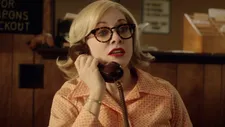 |
| Barbara Crampton in The Last Stop In Yuma County |
“I absolutely adored working with Francis, Jim, everyone on it,” says Richard. “It was an incredible experience and I'm so proud of how well it's done. Last Stop In Yuma County is the one I often tell people to go see. I've done hundreds of films and that's the one I'll often pick out now, if not always pick out for people to go see.
“I wasn't there for the screenings and later on there were the strikes so I couldn't go to festivals. I finally got to see it at home. Francis sent me a copy. I put it on my TV screen. I watched it with my 22-year-old, my middle son. And you know, they've grown up with me being an actor. They're totally unimpressed 90% of the time. And at the end of it, they just turned round and said ‘That was a good movie. You were good.’ That was the first time I've had a compliment from one of my kids for my work. So that tells you something right there.”
It sounds like a prize worth getting, I suggest.
“ Yeah,” Jim says. “Better than an Oscar.”
“It's great,” says Richard.





















